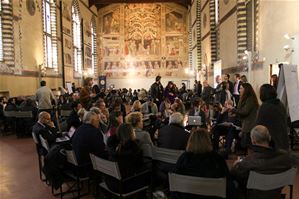
Dots on a map representing the location of Airbnb rentals in Florence, Italy
Airbnb conquers Florence: more and people are using the popular online portal to find accommodation in Florence. The premise is simple: Airbnb connects those in search of short-term rentals with people who have space to rent. According to the website Airdna, which crunches Airbnb rental data and analytics, to date there are 5,858 active rentals in Florence, and counting. In fact, the number is up by 40 percent in the last year says Alessandro Tortelli, director at Florence’s Centro Studi Turistici. But while this means convenience for travelers and money in the pockets of property owners, the City is being cut out of critical revenue to maintain services and infrastructure.
Most of the spaces available for rent are located in the city’s center: 74.6 percent are apartments, 24.7 percent single rooms and the remainder (0.7 percent) double or multiple rooms. Florence is a very popular city, which is evident in the fact that visitors take the time to write a review: 41.3 percent of the accommodation received over 50 reviews and 14.4 percent from 25 to 49 reviews. By way of comparison: in the whole of the United States, 80 percent of the apartments and rooms for rent have fewer than 10 reviews.
People seem to like their Airbnb experience in Florence, too: 59 percent of users have rated their accommodation with five stars (the highest) and 35 percent four and a half stars. The data provided by Airdna is devilishly detailed: for example, 87 percent of the Florentines don’t want any guests with pets and 98 percent don’t want smokers.
Florentines seem to be happy with Airbnb, too. Marco Gemelli, owner of the Da Mila bed and breakfast, started using Airbnb three years ago. He says, ‘It’s one of the few websites that works constantly, because it isn’t directly linked to the booking sites, and you interact directly with users. It’s also economically convenient, because it demands from the householder only around 4–5 percent of the rent, and never above 8 percent.’
The owner of Villa i Cipressi, an agriturismo just outside Florence, is enthusiastic: ‘Airbnb is definitely the future: if you just have a room, or an apartment, you can start doing business. Anyone can do it. In addition, there is also an insurance policy in case of damage to the house.’
Airbnb is an advantageous option for those seeking to supplement their income, as one owner explained: ‘Thanks to Airbnb, my son can now afford a few months of study abroad without losing his apartment in Florence, and when he returns home the apartment is always free.’
It’s almost a second job for some. One commented, ‘I manage several rooms and apartments in the center simultaneously. I make good money out of it … Wi-Fi is fundamental: it’s the first thing they ask me, even before the bath and the room!’
But it’s not as easy as it seems. The owner of A Casa di Francesca and Lucia B&B says you can’t improvise in this business. ‘Managing a B&B with professionalism and passion is not as easy as many think. It’s great work, but you have to be 100 percent physically and mentally dedicated to it: your guests must feel “at home while away from home.”’
One thing’s for certain: the arrival of Airbnb has brought about major change for a city whose core business is tourism and hospitality. But not everyone is happy. Hotels are furious and the Tuscan Region’s president, Enrico Rossi, spoke of ‘negative effects in terms of tax evasion and environmental sustainability.’ According to the Centro Studi Turistici, about 90 percent of householders fail to pay the tourist tax, an important source of revenue for the City of Florence—10 million euro at least, explained Lorenzo Perra, the man who holds the City’s purse strings, although the council has activated its offices to retrieve the evaded taxes.
Meanwhile, Airbnb claims that everything is in order, its policies are crystal clear and that it wants to cooperate with the City of Florence. Soon, Airbnb, promises, it will send a message to all users explaining how to come into compliance and pay the tourist tax. And while direct payment of the tourist tax is not currently possible through the online platform, Airbnb seems willing to find a solution.
Whatever happens, however, the revolution has started, and there’s no turning back.



